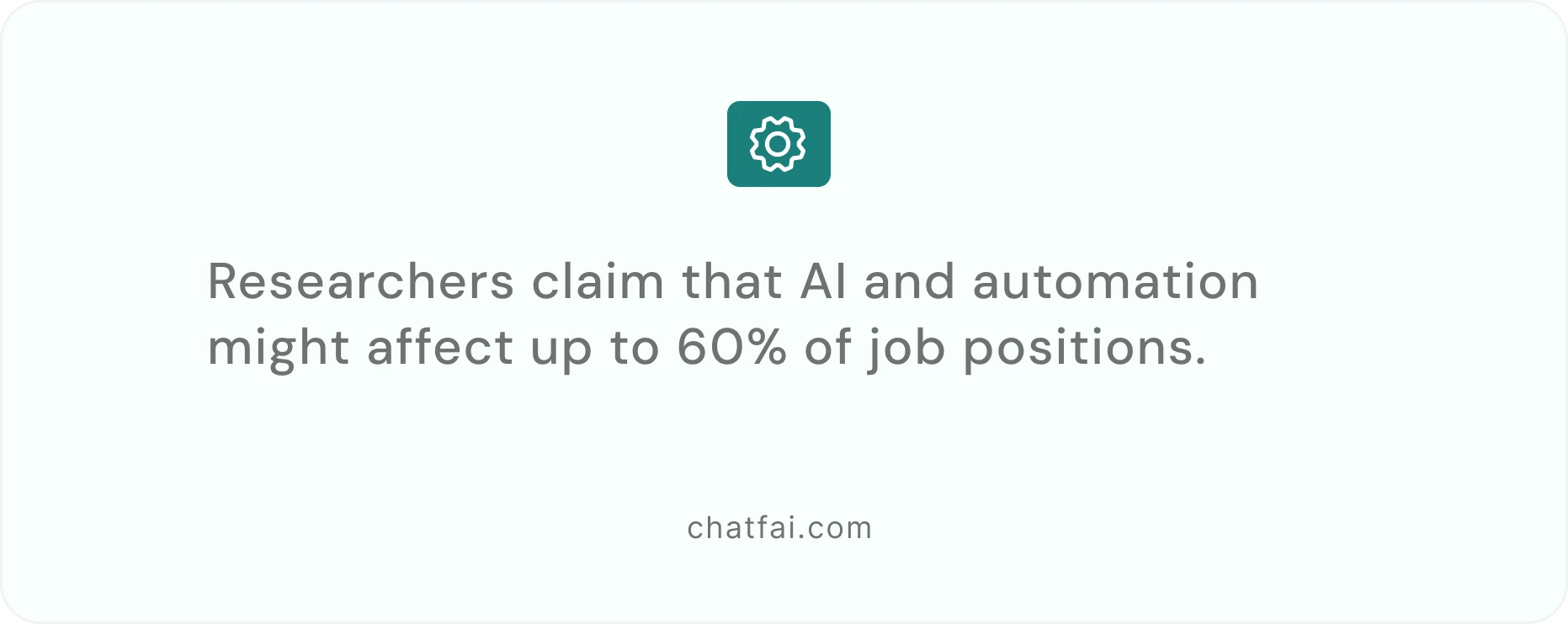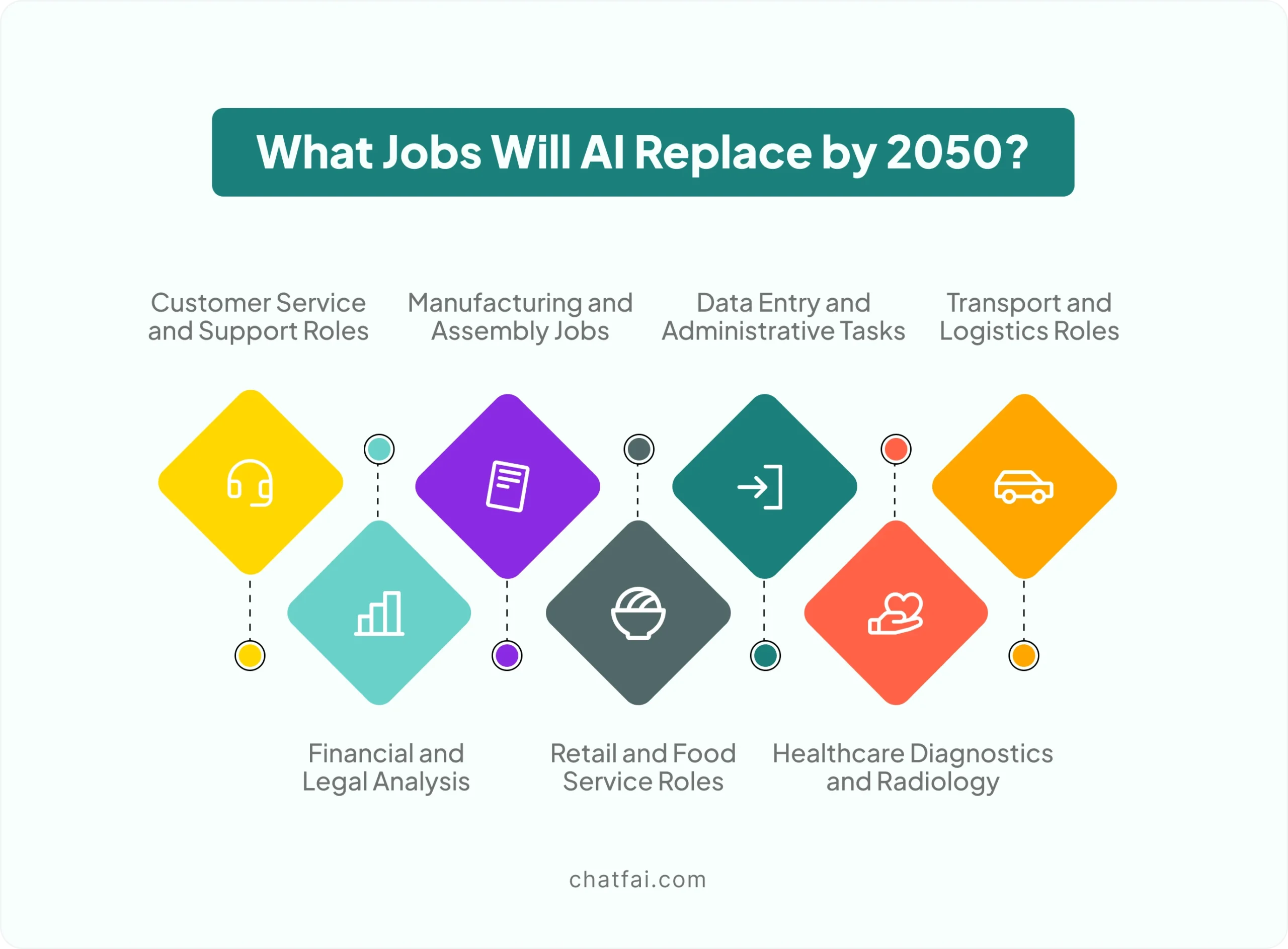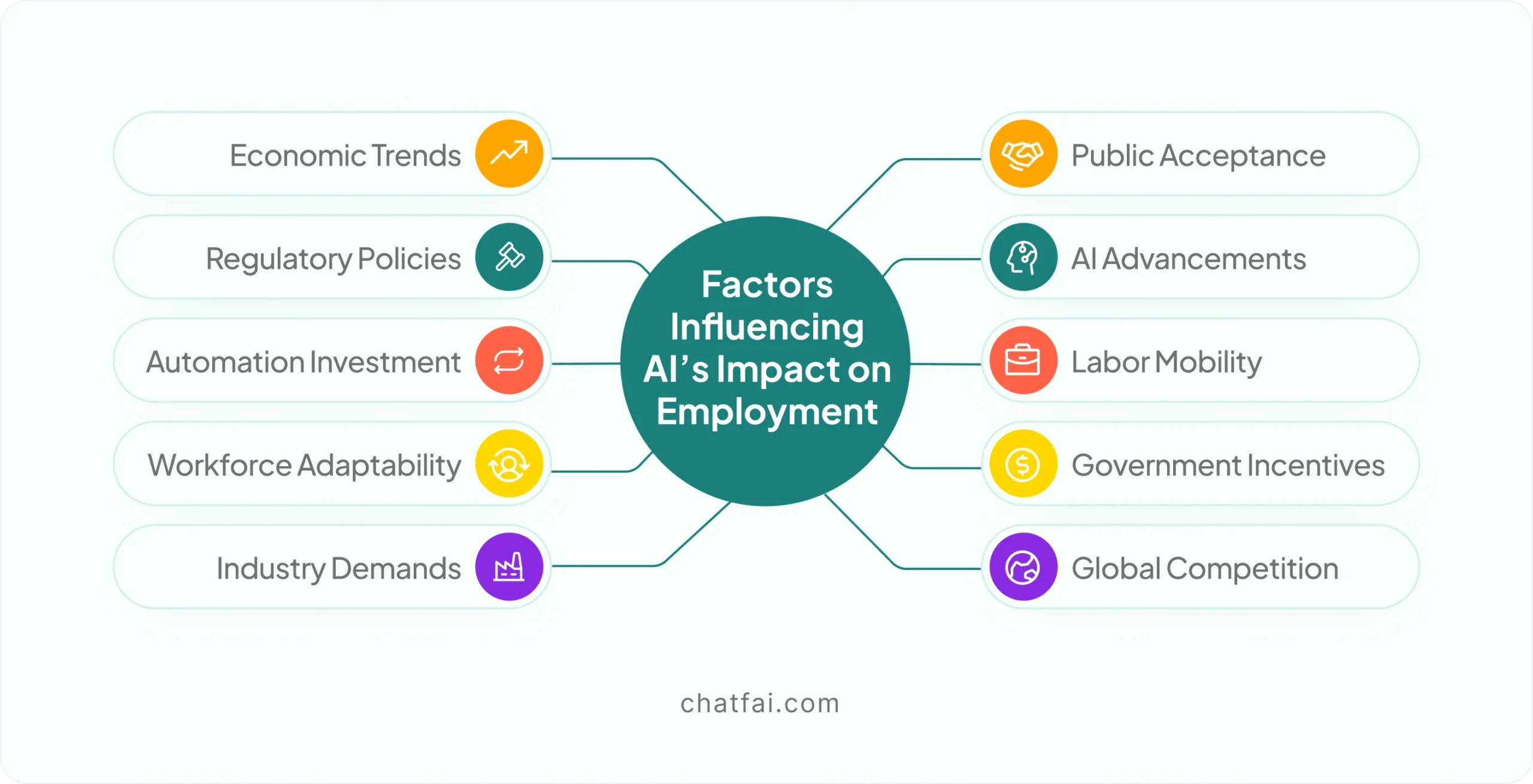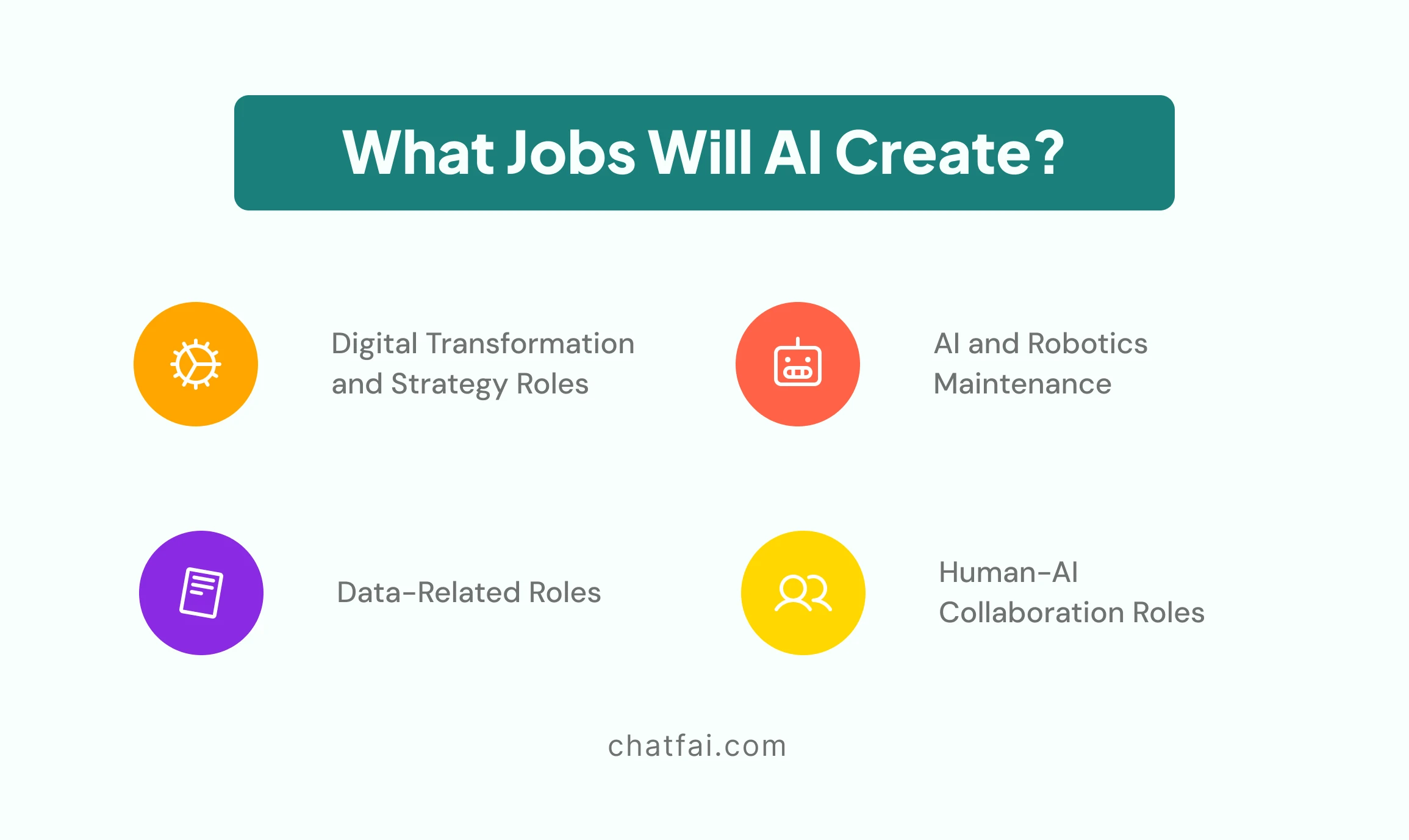Do you worry that your job will be replaced by Artificial Intelligence in 2050, or do you hope that your position will always be needed in the labor market?
While AI technology is evolving rapidly, almost every sector is undergoing some kind of makeover. Gone are the days when jobs could only be performed by human beings. These are being replaced by stunning AI technologies unimaginable a few years back.
The real question is, by the year 2050, how many of our jobs will be automated, and how will this affect the working population? Let’s understand the economic situation AI will affect and what jobs it will replace.
Meanwhile, we will look into what roles it may take and what else is captivating about the future.
Market Predictions About AI
Since the emergence of artificial intelligence and its quick acceptance in various sectors, market predictions show many changes are likely to occur in the job market.

That is an alarming figure, but let’s not be hasty. First, you need to understand what those trends anticipate. AI will replace some jobs but augment and build on others while opening up new opportunities.
Which professions will be doomed, and what kinds of human abilities will not be substituted by machines? The response to this question very much relies on the following:
- Changes in the economy
- People’s readiness
- Flexibility of the workforce
Certain occupations may be substituted; however, other jobs will develop to operate alongside AI, and new employment branches will appear. Moreover, the shift cannot be viewed in isolation. AI fosters an environment with ample space and a need for human skills.
What Jobs Will AI Replace by 2050?
Are you curious about how things will be in the working environment as AI becomes more advanced?
Research showed that about 47% of jobs in the US will be eliminated due to machines in the next ten years. That figure may appear daunting and intimidating, but it is only a tiny part of the whole picture.
Focusing on 2050, the question is: Which jobs will AI take over, and in which jobs will people need to work alongside the technology?
Many roles will evolve, alleviating humans of mundane work and enabling them to concentrate on higher-level strategic, qualitative, and social tasks. Some roles will be transformed more productively.
Let’s learn about a few positions that will undoubtedly face the effects of AI in the coming decades and discuss how such transitions might change us.

1. Customer Service and Support Roles
Robots, machine learning algorithms, and the AI revolution are all recruiting trends taking center stage in customer care service. Companies such as Amazon and banks have employed chatbots to answer frequently asked questions of their customers to increase efficiency and cut costs. The tasks that AI will be handling include:
- Answering easy queries
- Checking on order deliveries
- Carrying out exchanging procedures
- Resetting password functions.
2. Manufacturing and Assembly Jobs
The manufacturing sector has adopted various tools and technologies to enhance output. For instance, today’s robots operated through AI technology can be found in every 24-hour assembly line. They perform work with precision beyond that of most human beings.
AI in production systems has been integrated into vehicle assembly. It simplifies the processes, reduces production time, and reduces the rate of mistakes.
3. Data Entry and Administrative Tasks
Data entry can be automated more easily. Nowadays, Optical Character Recognition and many other automated processes make AI relieve you from too much intensive work within a short period and even without making mistakes.
It involves using OCR to scan and analyze bills, receipts, presentation forms, etc., which speeds up the data entry process.
4. Transport and Logistics Roles
We are already witnessing the future of automotive transport with the introduction of:
- Self-driving trucks
- Delivery drones
- Warehouses managed by artificial intelligence
Costs relating to labor requirements are greatly reduced by combining artificial intelligence, machine learning, and logistics.
5. Financial and Legal Analysis
Undoubtedly, AI is very good at processing information and analyzing large datasets. Therefore, AI is used to identify fraud or assess contracts. The ability to analyze an incredible amount of data in advanced predictive algorithms enables AI to recognize problems much earlier than people.
6. Retail and Food Service Roles
From stores without cashiers to checkouts where customers do their billing, AI is revolutionizing retail and food service in various ways. Automation eases repetitive processes, enabling firms to concentrate on offering better customer service.
The convenience of self-service checkouts and robot-operated kitchens reduces the need to hire cashiers and servers.
7. Healthcare Diagnostics and Radiology
AI has advanced in medical imaging in most healthcare systems. It assists medical practitioners in interpreting imaging scans, mainly CT. AI products analyze images faster in Radiology and Pathology, enabling healthcare providers to deliver quality care.
Read the complete guide on the benefits and uses of AI in healthcare.
Jobs That AI Can’t Replace by 2050
According to predictions, there are some jobs that AI can’t replace. Those are probably safe because they rely on creativity, compassion, or analytical thinking, which AI does not possess.
Creative and Strategic Roles
AI has proved incapable of duplicating human creativity and inventiveness. The creative industry requires a sense of culture, time, and emotion, which AI does not have.

There is no room for innovation or meaningful contact with any audience. Positions such as graphic designer, strategic marketer, and creative director will not cease to exist due to AI.
High-Skilled Trades and Craftsmanship
Skilled trades involve some coordination and flexibility that AI has yet to achieve. Electricians and carpenters, for example, have very practical jobs that require flexible thinking, even when solving problems.
The role of electricians, carpenters, and other skilled merchandise is expected to think beyond.
Healthcare and Social Services
Due to the nature of healthcare and social services, empathy and interpersonal interaction are essential. AI’s lack of the human factor makes it unsuitable for such positions.
A nurse, social worker, and psychologist all call for human feelings of compassion. AI cannot surpass these elements.
Research and Innovation-Based Roles
Creativity, flexibility, and the ability to cope with ambiguity are all research components. AI is there to assist research but not to autonomous breakthroughs.
Researchers and engineers are expected to engage in creative problem-solving. AI cannot meet these unrealistic expectations.
Scientific researchers and engineers need the creative problem-solving abilities that AI lacks.
Education and Childcare
In education and childcare sectors, AI is unable to meet some qualities provided by educators and childcare, such as:
- Adaptability
- Encouragement
- Human Touch
Positions such as teachers or even daycare attendants rely on skills that artificial intelligence lacks.
How Many Jobs Will AI Replace by 2050?
Forecasts from institutions such as the World Economic Forum indicate that it is possible to replace around 30% of existing jobs with AI by 2050. However, this value is subject to many determinants, such as:
- Social and economic dynamics
- Policy directions
- The degree to which AI is embraced by society in employment.
Here are the factors that influence the impact of AI on employment:

What Jobs Has AI Already Replaced?
Robots and other artificial intelligence applications have already rendered several positions in various sectors. A few of these are:
Banking: ATMs have already eased a great deal of work to be done by bank tellers.
Telecommunications: Customers do not communicate verbally with agents but use interactive voice response (IVR).
Manufacturing: Robotics has also made it possible to complete several assembly-line processes.
Customer Support: AI chatbots and online customer assistants are already performing many roles traditionally associated with the customer service sector. They have taken over control of retail, travel, and finance.
Transport and Delivery: Driverless drones and vehicles are beginning to mitigate the impact of conventional delivery drivers.
Data Processing: Optical Character recognition-equipped computer systems have also rescued data entry clerks. They read, scan, and feed data into information systems without manual input.
The examples demonstrate what jobs AI has already replaced. They show how automation is changing existing job descriptions and creating new ones.
What Jobs Will AI Create?
While AI could alter some jobs, it will bring promising new ones. Rather than taking occupations away, AI will facilitate the growth of an employment sector such as in:

AI and Robotics Maintenance and Programming
More robots and AI tools will require well-trained individuals to program and maintain them. The roles that are likely to be created by AI are:
- AI designers
- Robots technicians
- Ethics specialists concerning AI
Data-Related Roles
Data is the basis of Artificial Intelligence. Data control will require data scientists, handlers, and privacy experts.
Digital Transformation and Strategy Roles
Organizations must have strategists to incorporate and implement the AI revolution.
Digital transformation consultants will be in high demand for AI strategy leads.
Human-AI Collaboration Roles
Human managers endeavour to make sure that AI exists in tandem with human processes will demand:
- AI trainers
- Hybrid workflow managers
Will AI Replace Human Jobs Entirely?
No. AI will not replace human jobs entirely. There will still be jobs that cannot be fully filled by machines, robots, or even artificial intelligence. Most jobs demand sympathy, creativity, and ethics, which artificial intelligence does not possess.
So, will AI replace human jobs entirely? Not Likely.
Humans must always supervise and operate AI systems responsibly and ethically to achieve their objectives.
Wrap Up
That’s all you need to know.

AI will transform the labour market, affecting existing job roles and creating new ones. Jobs that are mundane and require routine work will be eliminated, while those that offer empathy, creativity, and complex thinking will be secured.
Want to know more about the changes technology, specifically AI, is bringing to the world?
Go to ChatFAI to get an interactive view of the topic. You can also talk to an AI and see what AI-based apps are in store soon.
FAQs
What job is being replaced by AI?
Jobs in data entry, customer support, and even manufacturing sectors are being replaced with intelligent machines as they easily handle repetitive tasks.
What are three jobs that will disappear in the future because of AI?
Jobs such as data entry clerk, assembly line worker, and junior finance analyst are among the professions that AI’s growth might wipe out.
Will AI replace all jobs by 2050?
No, AI will not take over every available job. Spheres that call for creativity, emotions, and intricate judgments regarding an issue will still require human intervention and thinking.
Which jobs are safe from AI?
Jobs in creative spheres, skilled crafts, healthcare, and education are safe. They necessitate qualities that AI cannot replicate.
What jobs will be gone by 2030?
Customer service roles, data entry, and certain assembly line positions may disappear by 2030 as AI and automation become more common.
What new jobs will AI create?
Jobs for programming AI, repairing robots, modernizing companies, manipulating data, and human-AI collaboration will appear.